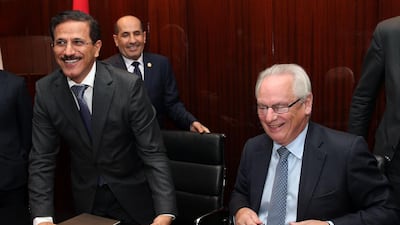LONDON // The UAE and Britain have set a new target for bilateral trade that would more than double its current value to £25 billion (Dh140.60bn) by 2020.
With economic links between the two countries growing each year, the objective was described by Sultan Al Mansouri, the Economy Minister, as “taking our relations to a new dimension”.
Mr Al Mansoori was speaking to The National during a two-day trade visit to the UK, which took delegates to London and Manchester.
He said the UAE was keen to achieve the new target, which has been agreed by the UAE-UK Business Council. Although he and British officials accepted the goal as “ambitious”, Mr Al Mansouri insisted it was achievable following the success of the two countries in reaching their previous target of £12bn in 2103, two years ahead of schedule. About two thirds of the total benefits UK exporters.
The minister contrasted the rapid growth of trade between the UAE and the UK with a decline from the 1990s until “we seemed to rediscover each other” from the turn of the century.
The trading relationship had a key part to play in the UAE’s drive to innovate and diversify its activities as the Arab world’s biggest economy after Saudi Arabia, he said. Oil and gas still account for 30 per cent of the UAE’s economy but the minister said it had already fallen from 90 per cent in 1971 with a projected reduction to 20 per cent within 20 years.
Sajid Javid, Britain’s secretary of state for business, innovation and skills, told the London section of the ministerial visit: “There has never been a better time for trade between the countries. It is fair to say it is stronger than ever.”
He listed a series of examples involving significant UAE investment in UK economic activity, highlighting this year’s order from Emirates Airline for Rolls-Royce engines to power 50 Airbus 380 jets due to enter service from next year. The contract is worth $9.2bn, the largest to be won by the British multinational.
Mr Javid, who is of Pakistani descent, also cited Masdar’s new 35 per cent stake worth £525 million in the UK’s Dudgeon offshore wind power project, a £1bn investment in urban regeneration in Manchester and the Dubai-based Toy Store’s new shop in the heart of London which created 120 jobs.
UAE imports from Britain amounted to Dh24.6bn last year, 3.5 per cent of the total, making the UK the sixth-largest customer behind China, the United States, India, Germany and Japan.
But Doing Business in the UAE, a guide book produced jointly by the Ministry of Economy and Britain's Institute of Export and launched during the UK visit, points out that a significant proportion of imports are re-exported to Saudi Arabia and Iran.
Philip Parham, UK ambassador to the UAE, comments in the book that Emirati exports to the UK have also substantially increased.
Bilateral UAE-UK trade stood at just £7.5bn when the first target was set in 2009. Sir Alan Parker, chairman of the corporate communications company Brunswick Group, likened the two-way business to a flywheel with “the wheel turning ever faster and more powerfully”.
He said: “We have shown over the years that it can be done and there is huge natural affinity between us. The fresh target is really ambitious, stretched even, but it is realistic.”
business@thenational.ae
Follow The National's Business section on Twitter


